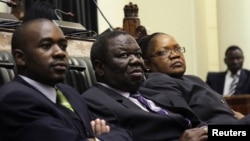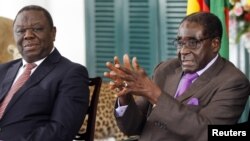JOHANNESBURG —
Debate is raging both inside and outside Zimbabwe about the country's proposed new constitution.
The document’s framers say the draft contains several advances, but acknowledge it is the result of a political compromise.
Opponents say they think the process was flawed and the new law still gives too much power to the already authoritarian president. Zimbabweans on both sides of the issue met in Johannesburg to debate.
Mugabe at heart of debate
Zimbabwe’s draft constitution is really a preview for the actual heavyweight bout: the general election that President Robert Mugabe wants to hold this year.
Mugabe, who turns 89 this month, is planning to run for office again. He has led the nation since independence in 1980. But before the election, Zimbabweans must approve a new constitution, as outlined under a power-sharing agreement made in the aftermath of the violent 2008 elections.
The nation is expected to vote on the draft in coming months.
Not a perfect document
Priscilla Misihairabwi-Mushonga, a minister and secretary-general of the Movement for Democratic Change party, says the document she helped write is not perfect. But, she says, it is an improvement on the current constitution.
She says the draft gives women more rights and limits presidential powers.
She also says that while the process of writing the document was not perfect, it started something that cannot be stopped.
“That opening up, I don’t think you can reverse it. It is a process which you can’t put a cost to it, you can’t put money to it. But it was something that was crucial, that was important for the people of Zimbabwe to have," she said.
The draft introduces presidential term limits of two five-year terms. However, the law is not retroactive, so President Mugabe - who is already the oldest serving head of government in the world - could serve another two terms before having to step down at the age of 99.
Misihairabwi-Mushonga lauded that as one of the best provisions in the new constitution.
"The message that it sends to the people of Zimbabwe is that you are never going to have another situation where you are going to have another Mugabe," she said. "I think that was a big score in terms of the conversations that we had in this constitution."
The proposed charter also appears to limit the president’s powers somewhat, and brings the previously unmonitored Central Intelligence Organization under government oversight.
The draft does not change positions on same-sex marriage - still banned - and the death penalty, which is still allowed. The capital punishment provisions have been somewhat relaxed, though, and now exempt women, the young and the elderly.
New York-based Human Rights Watch says the referendum plans do not mean the ruling ZANU-PF party will cease its repressive practices. The party and its followers have been repeatedly and widely accused of intimidation, oppression, unfair arrests and violence.
HRW has urged the European Union to maintain targeted sanctions on Mr. Mugabe and his inner circle until the nation carries out real reforms.
There is a subtext to all of this debate: a constitution is only as strong as the government that upholds it. And while Zimbabwean officials and activists say the constitution-writing process has raised hopes for greater democracy, all discussion seems to eventually return to one point: Mugabe.
Opponents voice objections
Constitutional opponent Lovemore Madhuku says this is one of his two reasons for voting against the draft. The other, he says, is that the process was flawed and that average Zimbabweans should have had more say instead of accepting a document from on high.
Madhuku, who leads the National Constitutional Assembly, a coalition of pro-democracy groups, has little confidence in the presidency.
"Our major problem in Zimbabwe has been the concentration of power in the president," he said. "If there’s any one reason why we thought that there should be constitutional reform in Zimbabwe, that reason would have been clearly that 'Look, we are giving too much power to one person, too much power to the president.' But if you have a very powerful president who is not restrained by law, just restrained by their own good heart, the law would be simply allowing them to go on and on and so forth. We create a problem for our country. That problem has not been solved by the current constitutional draft."
But Misihairabwi-Mushonga urged the draft’s opponents to be realistic. The writing of this constitution has been a long, labored and expensive process. It was originally supposed to be ready in 2010.
"Because we had to negotiate, it can’t be a 100 percent document," she said. "But is it indeed so bad that you think that it has not moved us forward?”
That’s something Zimbabwe’s voters will have to decide.
The document’s framers say the draft contains several advances, but acknowledge it is the result of a political compromise.
Opponents say they think the process was flawed and the new law still gives too much power to the already authoritarian president. Zimbabweans on both sides of the issue met in Johannesburg to debate.
Mugabe at heart of debate
Zimbabwe’s draft constitution is really a preview for the actual heavyweight bout: the general election that President Robert Mugabe wants to hold this year.
Mugabe, who turns 89 this month, is planning to run for office again. He has led the nation since independence in 1980. But before the election, Zimbabweans must approve a new constitution, as outlined under a power-sharing agreement made in the aftermath of the violent 2008 elections.
The nation is expected to vote on the draft in coming months.
Not a perfect document
Priscilla Misihairabwi-Mushonga, a minister and secretary-general of the Movement for Democratic Change party, says the document she helped write is not perfect. But, she says, it is an improvement on the current constitution.
She says the draft gives women more rights and limits presidential powers.
She also says that while the process of writing the document was not perfect, it started something that cannot be stopped.
“That opening up, I don’t think you can reverse it. It is a process which you can’t put a cost to it, you can’t put money to it. But it was something that was crucial, that was important for the people of Zimbabwe to have," she said.
The draft introduces presidential term limits of two five-year terms. However, the law is not retroactive, so President Mugabe - who is already the oldest serving head of government in the world - could serve another two terms before having to step down at the age of 99.
Misihairabwi-Mushonga lauded that as one of the best provisions in the new constitution.
"The message that it sends to the people of Zimbabwe is that you are never going to have another situation where you are going to have another Mugabe," she said. "I think that was a big score in terms of the conversations that we had in this constitution."
The proposed charter also appears to limit the president’s powers somewhat, and brings the previously unmonitored Central Intelligence Organization under government oversight.
The draft does not change positions on same-sex marriage - still banned - and the death penalty, which is still allowed. The capital punishment provisions have been somewhat relaxed, though, and now exempt women, the young and the elderly.
New York-based Human Rights Watch says the referendum plans do not mean the ruling ZANU-PF party will cease its repressive practices. The party and its followers have been repeatedly and widely accused of intimidation, oppression, unfair arrests and violence.
HRW has urged the European Union to maintain targeted sanctions on Mr. Mugabe and his inner circle until the nation carries out real reforms.
There is a subtext to all of this debate: a constitution is only as strong as the government that upholds it. And while Zimbabwean officials and activists say the constitution-writing process has raised hopes for greater democracy, all discussion seems to eventually return to one point: Mugabe.
Opponents voice objections
Constitutional opponent Lovemore Madhuku says this is one of his two reasons for voting against the draft. The other, he says, is that the process was flawed and that average Zimbabweans should have had more say instead of accepting a document from on high.
Madhuku, who leads the National Constitutional Assembly, a coalition of pro-democracy groups, has little confidence in the presidency.
"Our major problem in Zimbabwe has been the concentration of power in the president," he said. "If there’s any one reason why we thought that there should be constitutional reform in Zimbabwe, that reason would have been clearly that 'Look, we are giving too much power to one person, too much power to the president.' But if you have a very powerful president who is not restrained by law, just restrained by their own good heart, the law would be simply allowing them to go on and on and so forth. We create a problem for our country. That problem has not been solved by the current constitutional draft."
But Misihairabwi-Mushonga urged the draft’s opponents to be realistic. The writing of this constitution has been a long, labored and expensive process. It was originally supposed to be ready in 2010.
"Because we had to negotiate, it can’t be a 100 percent document," she said. "But is it indeed so bad that you think that it has not moved us forward?”
That’s something Zimbabwe’s voters will have to decide.











